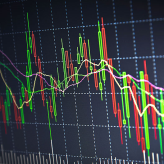Over the past few months, the Euro (EUR) has exhibited a whirlwind of activity in the Foreign Exchange (Forex) market. As the second most widely held reserve currency in the world after the USD, the EUR exerts a profound influence on the global financial landscape. Hence, every fluctuation, every rise and dip carries significant implications for a multitude of stakeholders, from institutional investors and multinational corporations to individual Forex traders and even tourists.
The EUR Storm: A Closer Look
Recently, the EUR experienced noteworthy volatility. While many initially attributed these fluctuations to typical market dynamism, a deeper analysis suggested an array of contributing factors, ranging from the European Central Bank's (ECB) policy announcements to the geopolitical tensions in Eastern Europe.
On the one hand, the ECB's decision to reduce its emergency pandemic-era stimulus resulted in a significant strengthening of the EUR. On the other hand, geopolitical uncertainties, primarily around the ongoing tensions in Eastern Europe, applied downward pressure on the currency. The combination of these contrasting influences created a storm of volatility in the EUR Forex market.
Breaking Language Barriers: The Role of Communication in Forex Trading
Interestingly, one factor that has been highlighted amidst these tumultuous conditions is the crucial role of communication in Forex trading. In the fast-paced and increasingly interconnected world of Forex, understanding the pulse of global events becomes an indispensable skill. This task is often complicated by the diversity of languages across different regions.
Riding the Forex Waves: What's Next for the EUR?
Looking forward, several potential scenarios could play out in the EUR Forex market. Should the ECB continue its monetary tightening, we could see further strengthening of the EUR. Conversely, any escalation in geopolitical tensions or an unexpected downturn in the EU economy could exert downward pressure on the EUR. Traders and investors will need to stay vigilant, continue their 'language translation' skills, and adapt to these unfolding dynamics to navigate the Forex market effectively.
Conclusion: The Unpredictable Flight of the EUR
In conclusion, the EUR's recent journey in the Forex market has been a turbulent one, stirred by a cocktail of factors ranging from monetary policy adjustments to geopolitical uncertainties. However, amidst the whirlwind, it offers valuable insights into the importance of effective communication and understanding - or 'translating' - the language of global economic events. As the market continues to evolve, the EUR's path could serve as a critical case study for Forex participants, helping them to anticipate and respond to future currency fluctuations.
Whether you are a seasoned trader, an aspiring investor, or simply an enthusiast interested in the dynamics of the Forex market, keeping a keen eye on the EUR's path will undoubtedly offer valuable insights and exciting opportunities.


Good stuff.